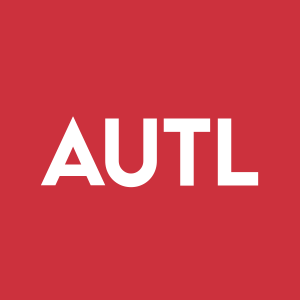Autolus Therapeutics Highlights Advancing Autoimmune Pipeline at R&D Investor Event
Rhea-AI Summary
Autolus Therapeutics (Nasdaq: AUTL) presented updates on its development pipeline and expansion plans in autoimmune diseases at an R&D investor event. The company highlighted the potential of obe-cel across multiple B cell driven malignancies and autoimmune diseases.
Key developments include:
- Preliminary data from Phase 1 CARLYSLE trial in six SLE patients showed promising results, with three patients achieving complete renal response by month three
- Plans to initiate Phase 2 pivotal study in lupus nephritis by year-end 2025
- Expansion into progressive multiple sclerosis (MS) with first patient dosing in Phase 1 trial expected by year-end 2025
- AUCATZYL US launch progressing with 38 centers fully activated
- Regulatory reviews ongoing in EU and UK, with MHRA decision expected in Q2 2025 and EMA in H2 2025
Positive
- Promising Phase 1 data with 50% complete renal response rate in SLE patients
- FDA alignment achieved on Phase 2 trial design and potential registrational path
- Expansion into multiple sclerosis market opportunity
- Strong progress in AUCATZYL launch with 38 centers activated
- Multiple near-term catalysts with EU and UK regulatory decisions expected in 2025
Negative
- dataset of only six patients in Phase 1 CARLYSLE trial
- Grade three hypertension observed in some patients
- Phase 2 and MS trials won't begin until end of 2025
News Market Reaction – AUTL
On the day this news was published, AUTL declined 7.28%, reflecting a notable negative market reaction.
Data tracked by StockTitan Argus on the day of publication.
- Company outlined potential for value creation driven by obe-cel across multiple B cell driven malignancies and autoimmune diseases, including acute lymphoblastic leukemia (ALL), lupus nephritis (LN) and multiple sclerosis (MS)
- Preliminary data in initial six patient cohort treated in Phase 1 trial in systemic lupus erythematosus (SLE) support progressing obe-cel into a planned Phase 2 pivotal study in lupus nephritis; first patient expected to be dosed in Phase 2 trial by year-end 2025
- Company plans to advance obe-cel in progressive forms of multiple sclerosis (MS); first patient expected to be dosed in Phase 1 trial by year-end 2025
LONDON, April 23, 2025 (GLOBE NEWSWIRE) -- Autolus Therapeutics plc (Nasdaq: AUTL), an early commercial-stage biopharmaceutical company developing, manufacturing and delivering next-generation programmed T cell therapies, today presented updates on its development pipeline and plans for expansion in autoimmune diseases at an R&D investor event.
The Company presented development plans to expand the obe-cel opportunity into autoimmune disease, including a potential registrational path for obe-cel in LN. They were joined by key opinion leaders David Isenberg, MD, FRCP, FAMS, Emeritus Professor of the University College of London (UCL) Centre for Ageing, Rheumatology and Regenerative Medicine, and Mark Freedman, HBSc, MSc, MD, CSPQ, FAAN, FRCPC, Professor of Medicine (Neurology) at the University of Ottawa and Director of the Multiple Sclerosis Research Unit. Drs. Isenberg and Freedman shared insights on the current clinical landscape, B cell depletion approaches and the significant unmet medical need in LN and MS.
“We believe that obe-cel could be a ‘pipeline in a product’ with the potential to deliver improved outcomes for patients and significant value creating opportunities for Autolus. We are building on obe-cel’s recent approval in the U.S. for the treatment of adult patients with relapsed or refractory B cell precursor ALL,” said Dr. Christian Itin, Chief Executive Officer of Autolus. “We have extensive clinical trial experience over several years, and data consistently show that obe-cel delivers a deep reset in the B cell compartment.1,2,3,4 Supported by our proprietary manufacturing, supply chain and commercial infrastructure, we have a strong foundation and are well-positioned to unlock the full value of this asset.”
“Lupus patients who have failed treatment with B cell targeting agents and calcineurin inhibitors require new therapeutic options,” said David Isenberg, MD, FRCP, FAMS, Emeritus Professor of Rheumatology at University College London. “Although a limited dataset, the CARLYSLE trial has shown encouraging clinical data in this advanced and relapsed patient population with lupus nephritis. Further evaluation to confirm these promising findings, including the favorable safety profile, are urgently warranted.”
R&D Event Updates
- Phase 1 data support plans to move into pivotal Phase 2 trial in SLE
- Preliminary data in six patients from the Phase 1 dose confirmation clinical trial (CARLYSLE) in refractory systemic lupus erythematosus (SLE) patients support progressing into a planned Phase 2 pivotal study. Three patients had complete renal response, all by month three. Complement normalized in all patients by month one. Rash, alopecia and mucosal ulcers resolved by month three and arthritis resolved by month one in all patients. Data show high peak expansion and deep B cell aplasia consistent with known obe-cel characteristics in oncology indications. No dose limiting toxicities (DLTs) or immune effector cell-associated neurotoxicity syndrome (ICANS) were observed in the study to date. Grade one cytokine release syndrome (CRS) was observed in three out of six patients. Transient hypertension, including grade three, occurred in five out of six patients, in one case with transient worsening of kidney function. Three patients had pre-existing hypertension at baseline.
- The Company has aligned with U.S. Food and Drug Administration (FDA) on the Phase 2 trial design and potential registrational path to approval and anticipates dosing the first patient in a Phase 2 trial before the end of the year.
- Full data with longer term follow-up from the Phase 1 CARLYSLE clinical trial is targeted for presentation at a medical conference in the second half of 2025.
- Expanding the obe-cel opportunity in autoimmune; Phase 1 trial in progressive MS
- Autolus plans to advance obe-cel into clinical development in progressive MS. The Company expects to dose its first patient in a Phase 1 dose escalation study by year-end 2025.
- Early-stage pipeline programs and collaborations support longer-term growth
- Autolus’ translational programs with UCL continue to fuel its early-stage pipeline, providing a cost-efficient path to development.
- AUCATZYL® US launch progressing on track
- Autolus is executing on AUCATZYL’s launch in r/r adult B-ALL with 38 centers fully activated as of April 22, 2025. AUCATZYL first quarter sales will be reported at the Company’s Q1 2025 financial results on May 8, 2025.
- Obe-cel is under regulatory review in both the EU and the U.K., and the Company expects to receive notification of approval status from the Medicines and Healthcare products Regulatory Agency (MHRA) in Q2 2025 and European Medicines Agency (EMA) in H2 2025.
Summary of Anticipated News Flow:
| ALL - Notifications from UK MHRA regarding approval in r/r adult ALL | Q2 2025 |
| ALL – Notification from EU EMA regarding approval in r/r adult ALL | H2 2025 |
| ALL - Initial data from PY01 trial in pediatric ALL | H2 2025 |
| SLE - Phase 1 CARLYSLE trial presentation at medical conference | H2 2025 |
| LN – Expect to dose first patient in Phase 2 trial | By year-end 2025 |
| MS – Expect to dose first patient in Phase 1 trial in progressive MS | By year-end 2025 |
R&D Event Webcast Details:
A replay of the webcast of the R&D investor event is available on the “Events” page in the “Investor Relations & Media” section of the Company’s website at https://www.autolus.com/investor-relations-media/events/.
Q1 2025 Financial Results Conference Call:
Management will host a conference call and webcast at 8:30 am EDT/13:30 pm BST on May 8, 2025, to discuss the Company’s first quarter financial results and provide a general business update. Conference call participants should pre-register using this link to receive the dial-in numbers and a personal PIN, which are required to access the conference call. A simultaneous audio webcast and replay will be accessible on the events section of Autolus’ website.
References:
- Roddie C, et al "Obecabtagene autoleucel in B cell acute lymphoblastic leukemia" N Engl J Med 2024; DOI: 10.1056/NEJMoa2406526
- Ghorashian, S., Kramer, A.M., Onuoha, S. et al. Enhanced CAR T cell expansion and prolonged persistence in pediatric patients with ALL treated with a low-affinity CD19 CAR. Nat Med 25, 1408–1414 (2019). https://doi.org/10.1038/s41591-019-0549-5
- Roddie C, et al. J Clin Oncol 2023;41:16_suppl, 7000
- Roddie et al, ASH 2023, Poster 2114
About Autolus Therapeutics plc
Autolus Therapeutics plc (Nasdaq: AUTL) is an early commercial biopharmaceutical company developing, manufacturing and delivering next-generation T cell therapies for the treatment of cancer and autoimmune disease. Using a broad suite of proprietary and modular T cell programming technologies, Autolus is engineering precisely targeted, controlled and highly active T cell therapies that are designed to better recognize target cells, break down their defense mechanisms and eliminate these cells. Autolus has an FDA approved product, AUCATZYL, and a pipeline of product candidates in development for the treatment of hematological malignancies, solid tumors and autoimmune diseases. For more information, please visit www.autolus.com
About AUCATZYL® (obecabtagene autoleucel, obe-cel, AUTO1)
AUCATZYL is a B-lymphocyte antigen CD19 (CD19) chimeric antigen receptor (CAR) T cell therapy designed to overcome the limitations in clinical activity and safety compared to current CD19 CAR T cell therapies. AUCATZYL is designed with a fast target binding off-rate to minimize excessive activation of the programmed T cells. AUCATZYL was approved by the FDA for the treatment of adult patients with relapsed or refractory B cell precursor acute lymphoblastic leukemia on November 8, 2024. In the EU, a regulatory submission to the EMA for AUCATZYL was accepted in April 2024, and in the UK, an MAA was submitted to MHRA for AUCATZYL in July 2024.
INDICATION
AUCATZYL® is a CD19-directed genetically modified autologous T cell immunotherapy indicated for the treatment of adult patients with relapsed or refractory B cell precursor acute lymphoblastic leukemia (ALL).
IMPORTANT SAFETY INFORMATION
WARNING: CYTOKINE RELEASE SYNDROME, NEUROLOGIC TOXICITIES, and SECONDARY HEMATOLOGICAL MALIGNANCIES
|
WARNINGS AND PRECAUTIONS
Cytokine Release Syndrome (CRS)
Cytokine Release Syndrome (CRS) occurred following treatment with AUCATZYL. CRS was reported in
Prior to administering AUCATZYL, ensure that healthcare providers have immediate access to medications and resuscitative equipment to manage CRS. During and following treatment with AUCATZYL, closely monitor patients for signs and symptoms of CRS daily for at least 14 days at the healthcare facility following the first infusion. Continue to monitor patients for CRS for at least 4 weeks following each infusion with AUCATZYL. Counsel patients to seek immediate medical attention should signs or symptoms of CRS occur at any time. At the first sign of CRS, immediately evaluate the patient for hospitalization and institute treatment with supportive care based on severity and consider further management per current practice guidelines.
Neurologic Toxicities
Neurologic toxicities including Immune Effector Cell-associated Neurotoxicity Syndrome (ICANS), which were fatal or life-threatening, occurred following treatment with AUCATZYL. Neurologic toxicities were reported in
Immune Effector Cell-associated Neurotoxicity Syndrome (ICANS)
ICANS events occurred in
The median time to onset for ICANS events after the first infusion was 8 days (range: 1 to 10 days) and 6.5 days (range: 2 to 22 days) after the second infusion, with a median duration of 8.5 days (range: 1 to 53 days).
Eighty-eight percent (21/24) of patients received treatment for ICANS. All treated patients received high-dose corticosteroids and
Counsel patients to seek medical attention should signs or symptoms of neurologic toxicity/ ICANS occur. At the first sign of Neurologic Toxicity /ICANS, immediately evaluate patients for hospitalization and institute treatment with supportive care based on severity and consider further management per current practice guidelines.
Effect on Ability to Drive and Use Machines
Due to the potential for neurologic events, including altered mental status or seizures, patients receiving AUCATZYL are at risk for altered or decreased consciousness or coordination in the eight weeks following AUCATZYL infusion or until resolution of the neurological event by the treating physician. Advise patients to refrain from driving and engaging in hazardous occupations or activities, such as operating heavy or potentially dangerous machinery, during this initial period.
Prolonged Cytopenias
Patients may exhibit cytopenias including anemia, neutropenia, and thrombocytopenia for several weeks after treatment with lymphodepleting chemotherapy and AUCATZYL. In patients who were responders to AUCATZYL, Grade ≥ 3 cytopenias that persisted beyond Day 30 following AUCATZYL infusion were observed in
Infections
Severe, including life-threatening and fatal infections occurred in patients after AUCATZYL infusion. Non-COVID-19 infections of all grades occurred in
Hypogammaglobulinemia
Hypogammaglobulinemia and B cell aplasia can occur in patients after AUCATZYL infusion. Hypogammaglobulinemia was reported in
Hemophagocytic Lymphohistiocytosis/Macrophage Activation Syndrome (HLH/MAS)
HLH/MAS including fatal and life-threatening reactions occurred after treatment with AUCATZYL. HLH/MAS was reported in
Hypersensitivity Reactions
Serious hypersensitivity reactions, including anaphylaxis, may occur due to dimethyl sulfoxide (DMSO), an excipient used in AUCATZYL. Observe patients for hypersensitivity reactions during and after AUCATZYL infusion. Secondary Malignancies Patients treated with AUCATZYL may develop secondary malignancies. T cell malignancies have occurred following treatment of hematologic malignancies with BCMA- and CD19-directed genetically modified autologous T cell immunotherapies. Mature T cell malignancies, including CAR-positive tumors, may present as soon as weeks following infusion, and may include fatal outcomes. Monitor lifelong for secondary malignancies. In the event that a secondary malignancy occurs, contact Autolus at 1-855-288-5227 for reporting and to obtain instructions on the collection of patient samples for testing.
Adverse Reactions
The safety of AUCATZYL was evaluated in the FELIX study in which 100 patients with relapsed or refractory B cell acute lymphoblastic leukemia (B-ALL) received AUCATZYL at a median dose of 410 × 106 CD19 CAR-positive viable T cells (range: 10 to 480 × 106 CD19 CAR-positive viable T cells with
The most common serious adverse reactions of any Grade (incidence ≥
Please see full Prescribing Information, including BOXED WARNING and Medication Guide.
Forward-Looking Statements
This press release contains forward-looking statements within the meaning of the "safe harbor" provisions of the Private Securities Litigation Reform Act of 1995. Forward-looking statements are statements that are not historical facts, and in some cases can be identified by terms such as "may," "will," "could," "expects," "plans," "anticipates," and "believes." These statements include, but are not limited to, statements regarding the therapeutic potential and expected clinical benefits of AUCATZYL/obe-cel (obecabtagene autoleucel) for adult patients with r/r B-ALL; Autolus’ ability to generate revenues from AUCATZYL, which is dependent upon maintaining significant market acceptance among physicians, patients and healthcare payors; Autolus’ ability to obtain and maintain regulatory approval for obe-cel for adult r/r B-ALL in additional territories and the timing thereof; expectations regarding the commercialization and marketing of AUCATZYL for adult r/r B-ALL, including expanding into additional territories and the related timing of reaching patients in such territories; the development of additional product candidates, including statements regarding the initiation, timing, progress and the results of clinical studies or trials and related preparatory work, the period during which the results of the trials will become available and our research and development programs; commercialization, marketing and manufacturing capabilities and strategy for AUCATZYL; the timing or likelihood of regulatory filings and approvals for product candidates, along with regulatory developments in the US, EU, the UK and other foreign countries; size and growth potential of the markets for AUCATZYL and product candidates, if approved; plans to collaborate, or statements regarding our current collaborations with BioNTech and others; and estimates regarding expenses, future revenue, capital requirements and needs for additional financing. Any forward-looking statements are based on management's current views and assumptions and involve risks and uncertainties that could cause actual results, performance, or events to differ materially from those expressed or implied in such statements. These risks and uncertainties include, but are not limited to, the risks that the impact of worsening macroeconomic conditions on Autolus’ business, financial position, strategy and anticipated milestones, including Autolus’ ability to conduct ongoing and planned clinical trials; Autolus’ ability to obtain a clinical supply of current or future product candidates or commercial supply of AUCATZYL or any future approved products; Autolus’ ability to obtain and maintain regulatory approval of its product candidates, including AUCATZYL and potential expansions into additional indications; Autolus’ ability and plans in continuing to establish and expand a commercial infrastructure in the US and to successfully launch, market and sell AUCATZYL and any future approved products; Autolus’ ability to successfully expand the approved indications for AUCATZYL or obtain marketing approval for AUCATZYL in additional geographies in the future; the delay of any current or planned clinical trials, whether due to patient enrollment delays or otherwise; Autolus’ ability to successfully demonstrate the safety and efficacy of its product candidates and gain approval of its product candidates on a timely basis, if at all; competition with respect to market opportunities; the risk that Autolus’ preclinical or clinical programs do not advance or result in approved products on a timely or cost effective basis or at all; the results of early clinical trials are not always being predictive of future results; the cost, timing and results of clinical trials; that many product candidates do not become approved drugs on a timely or cost effective basis or at all; and possible safety and efficacy concerns. For a discussion of other risks and uncertainties, and other important factors, any of which could cause Autolus’ actual results to differ from those contained in the forward-looking statements, see the section titled "Risk Factors" in Autolus' Annual Report on Form 10-K filed with the Securities and Exchange Commission, or the SEC, on March 20, 2025 as well as discussions of potential risks, uncertainties, and other important factors in Autolus' subsequent filings with the Securities and Exchange Commission. All information in this press release is as of the date of the release, and Autolus undertakes no obligation to publicly update any forward-looking statement, whether as a result of new information, future events, or otherwise, except as required by law. You should, therefore, not rely on these forward-looking statements as representing Autolus’ views as of any date subsequent to the date of this press release.
Contact:
Amanda Cray
+1 617-967-0207
a.cray@autolus.com
Olivia Manser
+44 7780 471 568
o.manser@autolus.com








